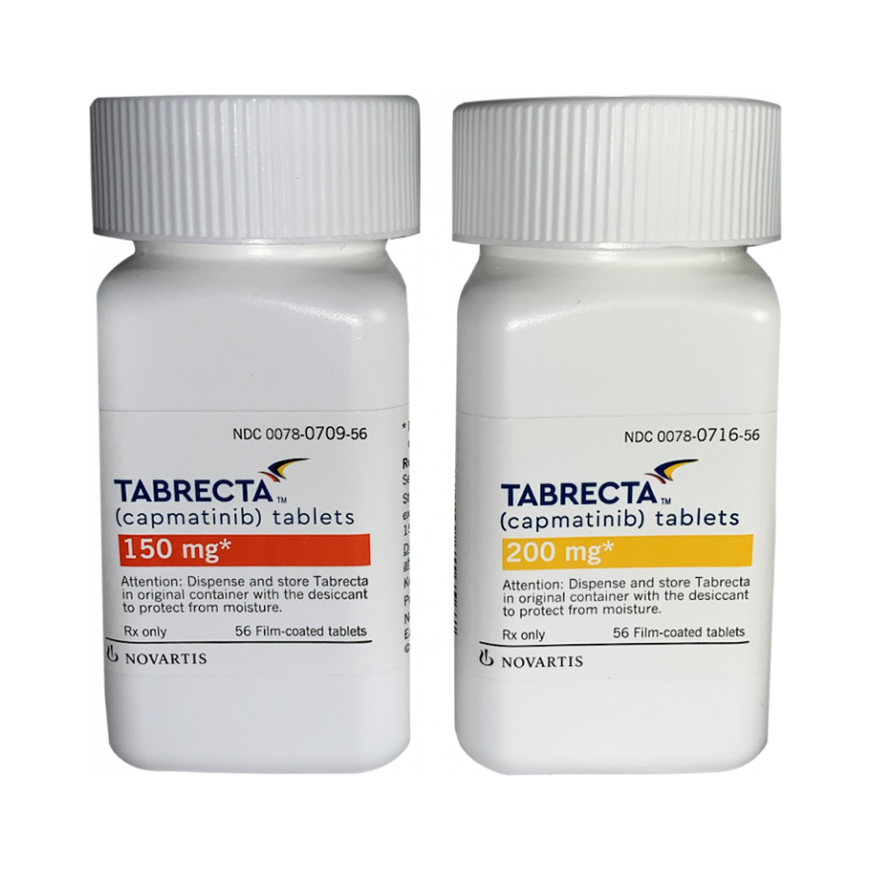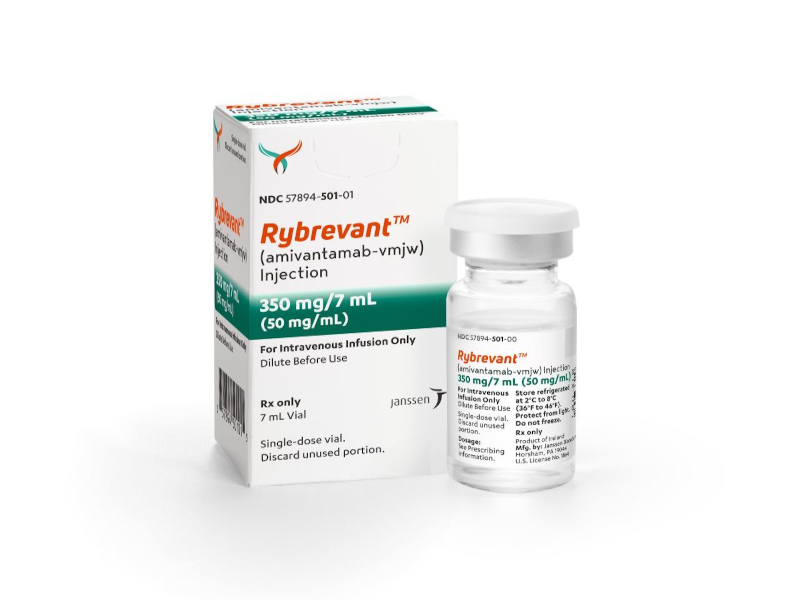Tabrecta (capmatinib) vs Rybrevant (amivantamab-vmjw)
Tabrecta (capmatinib) vs Rybrevant (amivantamab-vmjw)
Tabrecta (capmatinib) is an oral medication specifically approved for the treatment of adult patients with non-small cell lung cancer (NSCLC) that has a mutation leading to MET exon 14 skipping, as detected by an FDA-approved test. Rybrevant (amivantamab-vmjw) is an intravenous medication approved for the treatment of adult patients with NSCLC with epidermal growth factor receptor (EGFR) exon 20 insertion mutations, which also requires identification by an FDA-approved test. The choice between Tabrecta and Rybrevant would depend on the specific genetic alterations in a patient's NSCLC, as each medication targets different mutations, and a healthcare provider would recommend the appropriate treatment based on comprehensive genomic profiling of the tumor.
Difference between Tabrecta and Rybrevant
| Metric | Tabrecta (capmatinib) | Rybrevant (amivantamab-vmjw) |
|---|---|---|
| Generic name | Capmatinib | Amivantamab-vmjw |
| Indications | Metastatic non-small cell lung cancer (NSCLC) with MET exon 14 skipping mutations | Metastatic NSCLC with EGFR exon 20 insertion mutations |
| Mechanism of action | MEK inhibitor | Bispecific antibody targeting EGFR and MET receptors |
| Brand names | Tabrecta | Rybrevant |
| Administrative route | Oral | Intravenous |
| Side effects | Peripheral edema, nausea, fatigue, vomiting, dyspnea, and decreased appetite | Infusion-related reactions, skin rash, paronychia, musculoskeletal pain, and dyspnea |
| Contraindications | Hypersensitivity to capmatinib or any of the excipients | Hypersensitivity to amivantamab-vmjw or any of its excipients |
| Drug class | Tyrosine kinase inhibitor | Monoclonal antibody |
| Manufacturer | Novartis Pharmaceuticals Corporation | Janssen Biotech, Inc. |
Efficacy
Tabrecta (capmatinib) for Lung Cancer
Tabrecta (capmatinib) is a targeted therapy approved by the U.S. Food and Drug Administration (FDA) specifically for the treatment of adults with non-small cell lung cancer (NSCLC) that has spread to other parts of the body (metastatic) and whose tumors have a mutation that leads to mesenchymal-epithelial transition (MET) exon 14 skipping. This mutation occurs in a small percentage of NSCLC patients. The efficacy of Tabrecta was demonstrated in a clinical trial where patients with this mutation experienced a significant reduction in tumor size. The overall response rate (ORR) in the treatment-naive patient population was reported to be around 68%, while previously treated patients had an ORR of 41%.
Rybrevant (amivantamab-vmjw) for Lung Cancer
Rybrevant (amivantamab-vmjw) is another innovative treatment for NSCLC, specifically for patients with tumors that have epidermal growth factor receptor (EGFR) exon 20 insertion mutations. These mutations are associated with a poor prognosis and limited treatment options. Rybrevant is the first fully human, bispecific antibody approved for the treatment of this form of lung cancer. In a pivotal clinical trial, Rybrevant showed an ORR of 40% in patients with previously treated NSCLC with EGFR exon 20 insertion mutations. The median duration of response was also noteworthy, with some responses lasting six months or longer.
Comparing Efficacy in Targeted Patient Populations
When comparing the efficacy of Tabrecta and Rybrevant, it is important to note that each medication is tailored to a specific genetic mutation within NSCLC. Tabrecta is effective in patients with MET exon 14 skipping mutations, while Rybrevant targets EGFR exon 20 insertion mutations. Both medications represent a shift towards personalized medicine in lung cancer treatment, offering new hope for patients with these specific genetic profiles. The overall response rates and duration of response are key indicators of their efficacy and provide a basis for their use in the appropriate patient populations.
Conclusion on the Efficacy of Tabrecta and Rybrevant
In conclusion, both Tabrecta and Rybrevant have shown significant efficacy in their respective patient populations with metastatic NSCLC. These targeted therapies are part of an emerging class of precision medicine that offers improved outcomes for patients with specific genetic alterations. The approval of these drugs highlights the importance of genetic testing in the management of lung cancer, ensuring that patients receive the most effective treatments tailored to their unique tumor profiles. Continued research and clinical trials will further elucidate the full potential of these therapies in the fight against lung cancer.
Regulatory Agency Approvals
Tabrecta
-
European Medical Agency (EMA), European Union

-
Food and Drug Administration (FDA), USA

-
Pharmaceuticals and Medical Devices Agency (PMDA), Japan

Rybrevant
-
European Medical Agency (EMA), European Union

-
Food and Drug Administration (FDA), USA

Access Tabrecta or Rybrevant today
If Tabrecta or Rybrevant are not approved or available in your country (e.g. due to supply issues), you can access them via Everyone.org.
How it works

Make an enquiry
Choose the medicine you want to buy, answer a couple of questions, and upload your prescription to speed things up. We’ll get back to you within 24 hours.


Make an enquiry
Choose the medicine you want to buy, answer a couple of questions, and upload your prescription to speed things up. We’ll get back to you within 24 hours.


Breeze through the paperwork
We'll guide you through the required documents for importing unapproved medicine, ensuring you have all the necessary information.


Get a personalized quote
We’ll prepare a quote for you, including medicine costs and any shipping, administrative, or import fees that may apply.


Receive your medicine
Accept the quote and we’ll handle the rest - sourcing and safely delivering your medicine.

Some text on this page has been automatically generated. Speak to your physician before you start a new treatment or medication.
Let's talk
If you have any questions, call us or send us a message through WhatsApp or email:
Contact us




